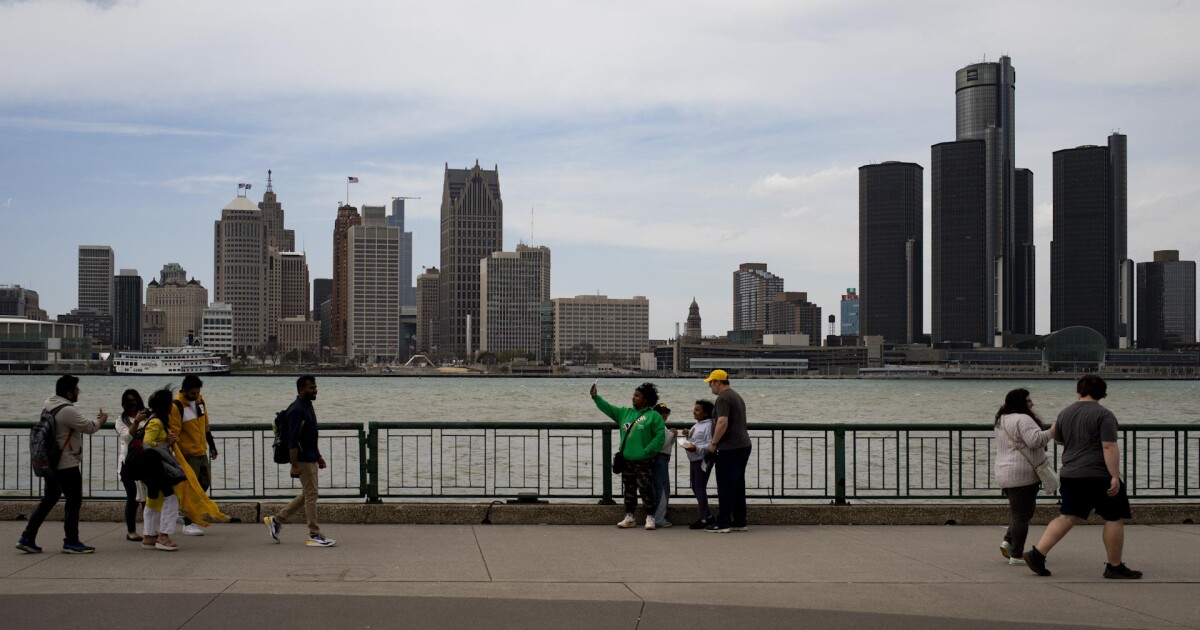Moody’s upgrades Detroit to Baa1, citing fiscal resiliency
3 min read

Bloomberg News
A little over a year after raising the city’s ratings to investment grade, Moody’s Ratings on Friday upgraded Detroit’s issuer and general obligation bond ratings again, to Baa1 from Baa2. The rating outlook remains positive.
“The city continues to bolster its financial resiliency and maintain solid operating performance, which will enable it to successfully weather the adverse effects of an economic slowdown,” Moody’s said in its rating report.
“This is what happens when elected leaders set aside us-versus-them politics and work together,” Detroit Mayor Mike Duggan said in a statement praising the office of the CFO, department heads, and City Council for “tremendous fiscal discipline over the past 11 years.”
The Detroit Financial Review Commission, which has provided state oversight over the city’s finances since it exited bankruptcy in 2014, voted to waive active oversight of Detroit on the same day the city received the Moody’s upgrade.
“Receiving this waiver is one more indication of the city’s strong financial management practices and a validation that the FRC, like Moody’s, expects them to continue,” the city’s CFO, Tanya Stoudemire, said in a statement.
When Moody’s
In upgrading the city on Friday, Moody’s also pointed to the fact that the city’s tax base has more than doubled over the past five years, thanks to an appreciation in home values and continued development. In fact, Moody’s said the city has a strong pipeline of major projects that are either planned or already under construction.
Those projects include a $3 billion mixed-use development featuring a $2 billion new Henry Ford hospital tower, a Michigan State University research facility and mixed-income housing.
The growth of the city’s tax base is due to a number of strategies, said Stephanie Davis, communications manager for the office of the CFO.
The city set a goal in 2014 to demolish 47,000 vacant homes to erase blight, a process that is now 98% complete. Detroit funded that effort through the $250 million
“With most of the blight removed from the neighborhoods, the remaining properties substantially increased in value,” Davis said. Overall, Detroit homeowners’ property value grew to $8.8 billion from $4.1 billion over the last decade.
“The city also invested in vibrant business corridors adjacent to the (formerly blighted) neighborhoods, which led to a near-tripling of neighborhood commercial values,” Davis added.
Additionally, the city increased public safety spending, leading to a reduction in violent crime, she said.
While Detroit still has some vulnerabilities, such as its concentration in auto manufacturing at a time of increasing tariffs, and its resident income ratio remains low at 51%, Moody’s said it expects the city’s full value per capita to improve.
Detroit’s available fund balance ratio hovers around 30% due to steady operations and revenue growth this year. And its long-term liabilities remain low — the city’s leverage ratio is between 200% and 350% — while its fixed-cost ratio is at 15%.
Moody’s noted that the city continues to face cost pressures and a restrictive revenue-raising framework, but said its outlook remains positive because it expects the city to build financial resiliency, aided by its strengthened tax base and revenue growth.
“At this point, the city has not experienced any material revenue changes due to tariffs,” Davis said. But she noted Detroit carefully monitors revenue streams, including income taxes, which could be impacted by tariffs.
The city’s Revenue Estimating Conference “will be the mechanism that monitors for any impact of tariffs,” she said.
The city’s debt plans are “modest,” Moody’s said, and Detroit had brought its outstanding debt down to about $2.7 billion by the end of fiscal 2024.
Davis said the city has used all previous voter authorizations for unlimited tax general obligation bonds, so the next mayor will need to decide if it wants to finance more projects using the debt millage. Duggan chose not to pursue reelection this year as he mounts a 2026 bid for Michigan governor.







